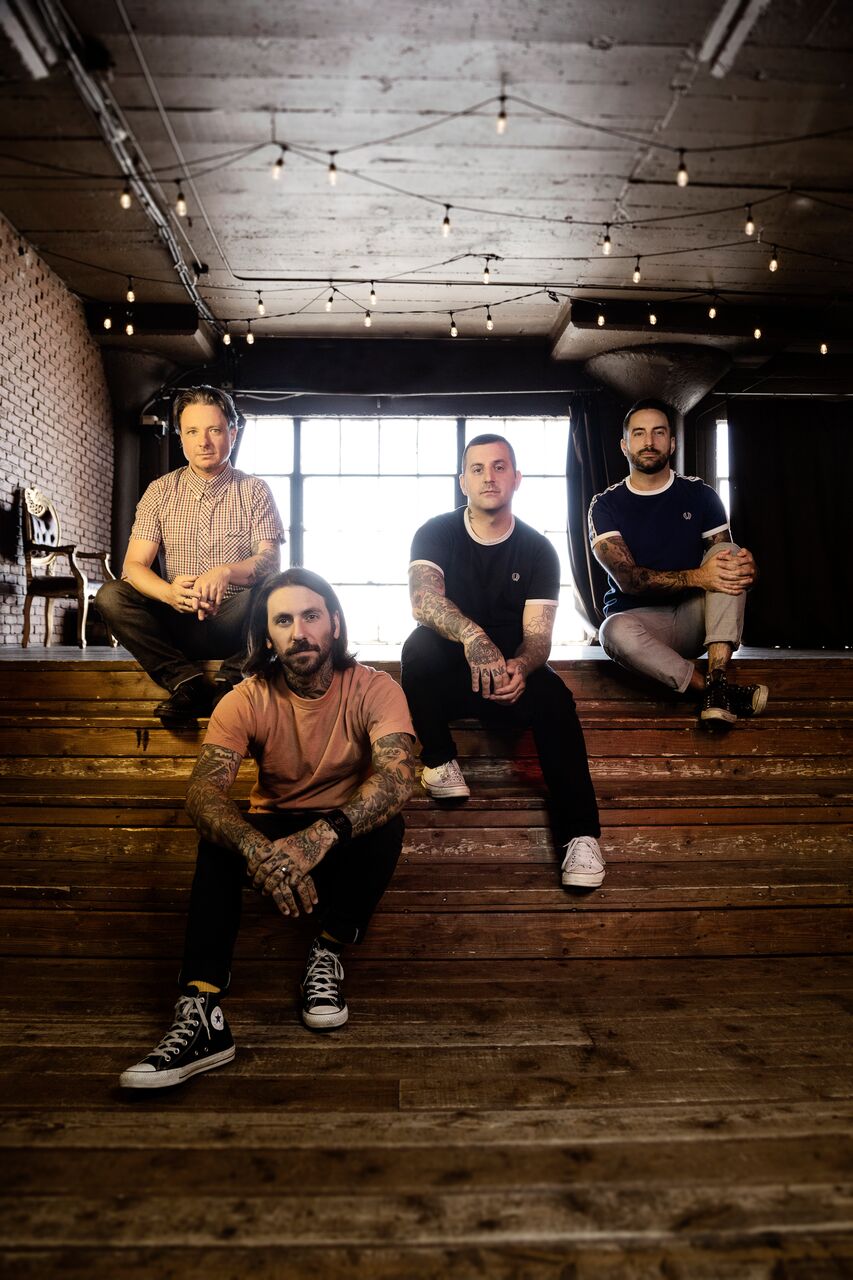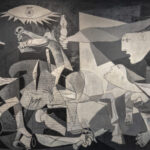Interview: On ‘Interrobang,’ Bayside have more statements than questions
Posted: by The Alt Editing Staff

Photo by Megan Thompson
On the opening verse of “Prayers,” the first single from Bayside’s new album, Interrobang, vocalist Anthony Raneri declares in his singsong growl, “If there’s somewhere better than this / Then I don’t know what it is.”
While Raneri (who is notoriously reticent to discuss specific meanings behind lyrics) may not have intended it, the line is a pretty damn perfect summation of life these days for the foursome. With their eighth album, the group are more sure than ever of who they are and where they want to be.
Interrobang is a return to the heavier sound that characterized earlier Bayside records, from 2011’s Killing Time even back to their 2004 debut, Sirens and Condolences. “We definitely want to innovate within our sound, but it’s equally important to us to sound like Bayside. Going into this record, we thought about that a little less—sounding like Bayside. We’ve realized we’re going to sound like Bayside no matter what we do,” says Raneri, now 37.
All the Bayside trademarks are here. “I sing the way that I sing. Jack plays guitar the way that he plays. We have certain melodic tendencies,” says Raneri. Though the band typically uses a D Standard tuning, your well-trained Bayside ear did indeed recognize a return to one of their occasional heavier tunings, Drop C, throughout Interrobang.
Sirens and Condolences, banger “Masterpiece” used that tuning; so too did “Carry On,” off 2008’s The Walking Wounded, and Killing Time’s “It’s Not a Bad Little War.” Interrobang continues that tradition with “Prayers” and “Numb,” tracks that have jumped out to fans with their metal-adjacent sensibilities.
Interrobang feels downright gift-wrapped for lead guitarist, Jack O’Shea, with its heavy riffs and intricate melodies. The sound is vintage Bayside, all grown up, with a hat tip to producer Cameron Webb. Webb has produced Bayside’s peers and predecessors. From punks like NOFX, Lagwagon, and Alkaline Trio; to heavier groups like Motorhead and Megadeth.
However, Bayside took some risks on Interrobang, and not just musically. “A big part of our music has always been drama,” Raneri says. Inspired by a steady diet of pop, showtunes, punk, and metal, Bayside has always sought to tell a story with their records, to build in moments of tension and resolution. But a driving question for the band when recording this album was, how else can we create drama?
Bayside fans are notoriously devoted. They’ll get inked with each new album’s cover art, and their social media posts are strewn with the hashtag #BaysideIsACult. But even diehards were caught off guard when Bayside announced that Interrobang would release on October 4, just six weeks after they dropped the first single, “Prayers.”
“It was planned from before we even recorded the record,” Raneri says. “While we were on the acoustic tour, we played at the Troubadour in LA, and the label [Hopeless Records] came out. We went out to dinner after the show, and I said, ‘I have this idea; I wanna announce the record two weeks before it comes out.’”
Telling your label you want to roll your new album out over two weeks is sure to raise an eyebrow. Telling them so over a meal could prompt a bout of choking. Before selling Hopeless on why the idea just might be a genius bit of marketing, however, Raneri had to convince them why it wouldn’t actually blow up in their faces. “I had to prove the point that we’re not gonna miss out on anything because of this,” he said.

When Bayside got off the ground 20 years ago, the album rollout process happened over months. It had to factor in a radio campaign, a print campaign—an interview for a magazine feature that would publish two months later. Not to mention the time needed to manufacture and ship records to tens of thousands of record stores around the country.
Needless to say, times have changed.
“Well, we’re not gonna be on the radio,” Raneri says, laughing. “They don’t really play rock music on the radio. There aren’t really any print magazines we’re gonna be in; they don’t cover music like this anymore. There are no record stores; we don’t have to worry about distribution.”
It all might sound so very nihilistic, but rather than a mourn an era long gone, Bayside is taking the opportunity to adapt and are running with it. “The industry has changed, and we’re trying to change with it and not fight against it,” Raneri says. “We came up in a more traditional way. For us, someone liked our demo and they were like, ‘We’ll plug you into the system.’ Now, there’s no system to be plugged into.”
Releasing a rock album in 2019—a fraught time for guitar-forward music—presents no shortage of difficulties. (In Pitchfork’s “Best of the 2010s” album ranking this month, only one act that might be considered “rock” cracked the top 25). But as music continues to become more and more esoteric, labels and genres don’t mean as much as they once did. Now, perhaps more than any other point in their career, that genre fluidity has become one of Bayside’s biggest strengths.
“We thought for a long time that not fitting in a box was a problem,” Raneri says. “The mid-2000s big emo boom that we were semi a part of, the label we were on [Victory Records] and the bands we were associated with, we thought, well, this sucks, these bands are getting bigger faster, they’re so perfect for right now, they’re what the kids are looking for right now.
“We’re starting to see now that it’s not that we don’t fit into this one scene—it’s that we can fit into lots of them,” he adds. “We always stayed the course. Our idea was always that people will come around; if we don’t do anything that perfectly fits into right now then we’ll never be dated. That paid off; that was the right idea.”
The ongoing breakdown of a once-established system thus became a boon rather than a hindrance to Interrobang’s unconventional release. “Now it’s so difficult to get the fans’ attention and to keep it,” Raneri says. “Within our genre—within our circle of friends, even—the Menzingers record came out, the Lagwagon record came out, all on the same day [October 4]. So what we did by announcing the record two weeks before it came out, we kind of waited for the deck to get cleared. We can’t keep people’s attention for two months; we don’t have enough content, we don’t have enough marketing money.” “We can keep it for two weeks, though,” he adds.

The script played out just as the band had hoped. Bayside released “Prayers,” their first new studio single since 2016 (not counting 2018’s “It Don’t Exist” on Acoustic Volume 2), on August 20. As titillated fans speculated about a new album and tour, exactly four weeks later, Bayside revealed that Interrobang would drop on October 4. Rapidfire, the band dropped two additional singles—eponymous track “Interrobang” and, a week later, “Bury.” The week of October 4 opened with another new track premiere, “Numb,” and then the pièce de résistance, the album itself.
“With two weeks, it’s like, ‘Here’s a new song, here’s another new song, now we’re announcing a tour,’” Raneri says. “For two weeks, we can do something new every day that’s exciting.”
Fans couldn’t get enough. “Prayers” broke 100,000 streams in its first week. And their excitement for the first new Bayside album since 2016 was rewarded with a record that, as it turns out, is one of the most balanced and mature iterations of Bayside yet. The band are confidently striding into their future, but not without a glance back at their past.
As a punctuation mark, an interrobang both makes a statement and poses a question. What questions are Bayside still asking themselves some two decades later, and what’s the statement they’re hoping to make with this album?
“We ask ourselves how we can keep it fresh, and we think that with Interrobang, the statement is that we kept it fresh—we really made exactly the record we wanted to make,” says Raneri. “When you make a lot of records, after time passes you think you would have done this differently or that differently, especially some of the records I made at 21 years old. I’m a different musician and writer now at 37 than at 21.”
He’s a different person now, too, and his personal growth is easy to chart through Bayside’s lyrics over the years. While he’ll rarely discuss the inspiration or meaning behind his lyrics—instead finding fulfillment when fans interpret lyrics in a way that means something to them personally—Raneri was open about one line in particular on Interrobang.
On “Bury Me,” Raneri sings, “I want your respect but not your praise.” “For me, that’s the real key line in that song,” he says. “It’s just sort of a comment towards what is happening lately in music and entertainment as a whole. Don’t put these people on pedestals, don’t put me on a pedestal. I just write songs. I’m just a guy. Your favorite singer is not your favorite song. They’re a person who’s fallible. That’s what the song’s about to me; respect is earned and praise can’t be.
“We’re seeing a lot of our idols fall. Enjoy the music. If you meet somebody in a band, they’re not the song you’ve spent the last 10 years listening to. Maybe that’s being nihilistic again, but I stopped just short of saying don’t have idols, don’t look up to anybody. Choose your idols wisely. Choose them for what they do, by how they act and what they add to the world.”
Bayside’s lyrics have always been confessional in nature, and fans gravitate to Raneri for his raw honesty and powerfully evocative writing. But to borrow another line from the song, “You never know the person preaching to you.”
Lyrics almost always come after the music in Bayside’s album writing process. And on Interrobang, they were their own toughest critics as they sequenced new songs. “We’d ask ourselves, ‘Where should we go next?’ ‘This is good, but is it right for this album?’ We talked a lot about what kind of record we wanted to make before we started writing anything.”
The end result is an album that will surely take its place as one of the biggest exclamation points in the band’s 20-plus year history—no question.
Follow Bayside
_
Michelle Bruton
The Alternative is ad-free and 100% supported by our readers. If you’d like to help us produce more content and promote more great new music, please consider donating to our Patreon page, which also allows you to receive sweet perks like free albums and The Alternative merch.










